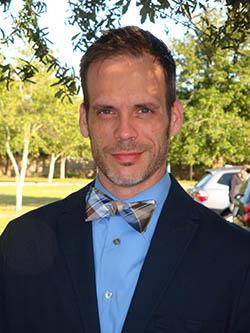Social work welcomes new faculty member: Dr. Philip Osteen

The College of Social Work welcomes a new valued faculty member to its social work family. Dr. Osteen prior to joining the College was an assistant professor at the University of Maryland School of Social Work. Learn more about Dr. Osteen’s research and experience by reading the interview below.
What are your previous experiences in social work, research and education?
DR. OSTEEN: I have 25 years experience in social work practice, research, and education, often working in two or three of these domains at the same time. I worked in residential/outpatient mental health services for adults with severe symptoms of mental illness for 12 years before transitioning into a research coordinator role in a large national HIV-prevention study. During that time I also entered two PhD programs (Social Work and Statistics) and graduated in 2009. I taught as an adjunct professor during my PhD program and have been teaching MSW and PhD students as an Assistant Professor since 2008. I have taught across the MSW foundation curriculum in the past; more recently I have taught research methods, statistics, and clinical SW with LGBTQ populations.
What are your primary research interests?
DR. OSTEEN: I have several research interests, but the primary areas are suicide prevention training, and the integration of culture into research, education, and practice. My current work on suicide prevention training integrates research questions about the effectiveness of training models and identifying factors that may moderate or mediate the acquisition of skills for identifying and intervening with individuals at high risk for suicide. Research in this area has shown that there are numerous training programs demonstrating positive changes, but there is less research identifying why and how these changes occur. Additionally, there is little research on whether or not training outcomes can be linked to reduced suicides.
What drew you to your interest in the field of social work research?
DR. OSTEEN: A combination of personal and professional events led me to wanting to know more about suicide prevention. I knew that if I wanted to be able to help prevent suicides, I would need more targeted training than I had received in school or through work. This led me to explore the components of effective training.
What do you think is the most important contribution of this research to the general public?
DR. OSTEEN: The US Surgeon General has identified suicide as a significant public health issue, and that suicide prevention is everyone’s (professionals and laypersons) responsibility. To this end, identifying effective suicide prevention trainings for both professionals and community members is an essential step in reducing suicides. Everyone may potentially encounter someone at risk for suicide, and being able to identify and assess this risk will lead to more individuals receiving treatment and saved lives.
In what ways can you engage students in research?
DR. OSTEEN: I have benefitted from student involvement in several research projects, both as research assistants and as participants. Over the last several years I have sponsored a MSW student as my research assistant as well as sponsoring one or more PhD students. My goal as an instructor is to help social work students understand the critical link between research and practice. Being involved in a research project is one way to achieve this, but it is equally, if not more, effective to teach students how to do their own research through program and practice evaluation.
How do you relate research to education and service?
DR. OSTEEN: Research informs education (and practice) and helps me to incorporate the most current, informative, and relevant advances in social work practice into the classroom. As someone who teaches many statistics and research methods courses, the importance of research is a central theme in my teaching. I also use my research skills and knowledge to provide service to the field of social work. I volunteer as a reviewer of research manuscripts for several social work journals. I provide pro bono statistical and research consultation to a variety of organizations from the local level to the national level. My work has given me the opportunity to participate in, learn from, and inform the national dialogue on suicide and suicide prevention though my association with the National Action Alliance Suicide Prevention Research Prioritization Task Force.
